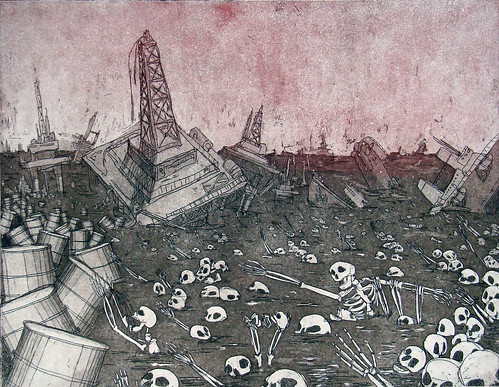"Atra Mors" Print by Fotios Zemenides.
Artist's Statement
The story of humanity is replete with hardship and suffering. Our species’ struggle is what has brought us to this point in time. All of our greatest cultural and technological innovations; our music, art, engineering, science, political systems, philosophy, literature - our very way of life, are products of surviving a harsh and deadly environment. Our defiance of oblivion made us smarter, stronger, and wiser. We are not however immortal, invincible or unassailable. There is a great deal about us that still must evolve. Our treatment of one another and of the environment is in desperate need of refinement as we are quickly making the world uninhabitable for us.
This image questions the ramification of the world's increasing demand on oil. The title refers to the Latin translation for the "Black Death" or as we know it: the Great Plague that ransacked Medieval Europe and killed off nearly one half of the continent's population. This occurred because of several reasons, one being population density in urban centers which saw the rapid spread of the plague but also due to unregulated commerce which brought the disease from the east in the first place. This unabated commercialism was the result of high demand of inexpensive commodities and goods, without concern of quality. Before this time, the Roman Empire had a well maintained, regulated and taxed shipping and commerce system, which prevented any major pandemic from taking hold. Medieval Christianity had no such standards but learned its lesson which helped bring about the Renaissance. We are now reliving the complications brought about from unchecked consumerism which oil consumption is the heart of. The catastrophe this time however will not be a mere pandemic but environmental destruction on a scale which will make life for human civilization untenable. Of course we offer our up our future generations to this fate in the struggle to consume as many manufactured goods as possible.
This print is meant to remind the viewer that potentially civilization ending, man made disasters still run rampant throughout the entire world and affect us all. We should not take for granted what we have and what all of our achievements depend on.
Fotios D. Zemenides, MFA
Fotios Zemenides was born a refugee, his mother fleeing the Turkish invasion of Cyprus with him in utero, while his father stayed behind to fight. The very nature of his existence is a paradox, for he is both a child of Chicago simultaneously living with a reality unfulfilled. Displaying aptitude in the visual arts from a young age, Fotios choose to pursue his undergraduate studies in fine art and art history at DePaul University in Chicago. Paul Jaskot introduced him to the notion of understanding art by becoming a student of history, thus placing the work in its socio-political context. As the very essence of social justice was ingrained into his being from a young age, his intended goal was to use his abilities to create art that force the viewer to question the way of things and ask difficult moral and ethical questions of themselves.
After a brief hiatus into the world of urban planning and development he returned to art, receiving a Master of Fine Art in painting and drawing at the American Academy of Art in Chicago. Under the tutelage of Joe Kegler at the Chicago Fine Art Foundry, he mastered the process of bronze and aluminum casting for sculpture. He also studied classical academic principals of painting and anatomy under David Jamieson and Melinda Whitmore from the Vitruvian Fine Art Studio.
He is currently a member of the North Shore Art League where he practices with veteran printmakers Audrey Niffenegger, Bert Menco, Diane Thodos, Paula Campbell, Elizabeth Ockwell and Diane Dorigan. Via the Beverly Arts Center, he acts as an outreach art instructor for underprivileged youth in Chicago’s South Side and is a staunch promoter for increased government subsidy of Art education. As a member of the Advisory Committee for the National Hellenic Museum, he is working to guide the institution to become a significant player in the art and culture advocacy infrastructure of the Midwest. He lives in Chicago with his wife Joanne who is an elementary school teacher.
Contact: fzemenides@aol.com
http://www.fotioszemenides.blogspot.com/

No comments:
Post a Comment